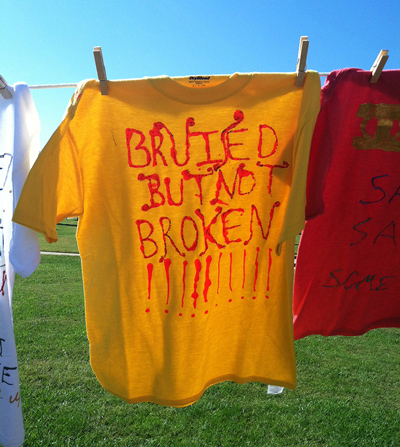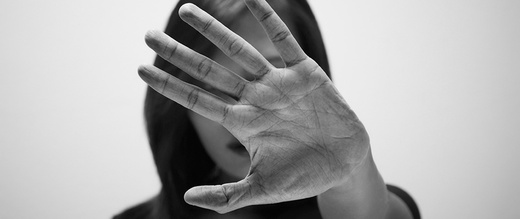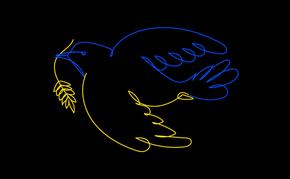The views expressed in our content reflect individual perspectives and do not represent the authoritative views of the Baha'i Faith.
The world in the past has been ruled by force, and man has dominated over woman by reason of his more forceful and aggressive qualities both of body and mind. But the balance is already shifting; force is losing its dominance, and mental alertness, intuition, and the spiritual qualities of love and service, in which woman is strong, are gaining ascendancy. – Abdu’l-Baha, Star of the West, Volume 2, p. 4.
Seeing and treating females as sex objects represents one of the most disturbing and harmful characteristics of an out-of-balance society. It demeans and debases women and girls, and creates unhealthy self-images in both genders. The Baha’i Faith and its institutions have spoken out directly and clearly about this issue:
Violence against women is a yardstick by which one can measure the violation of all human rights. It can be used to gauge the degree to which a society is governed by aggressivity, dominated by competition and ruled by force. Abusive practices against women have frequently been and are still being justified in the context of cultural norms, religious beliefs and unfounded “scientific theories” and assumptions. But whatever its political or religious system, a society patterned on dominance inevitably gives rise to such distortions of power as violence against women.
It is becoming increasingly evident, however, that all forms of violence against women degrade not only the victim but the perpetrator as well. Those who inflict violence on women are themselves among the casualties of power-based systems. When unbridled competition, aggression, and tyranny destroy the fabric of society, everyone suffers. In the Baha’i view, “the harvest of force is turmoil and the ruin of the social order” and violence against women is a grave symptom of this larger disorder. – Baha’i International Community, 1995 Aug 26, Ending Violence Against Women.
The acceptance of these norms links directly to the rampant violence against women, the discussion of which polite society tends to avoid, as poet Rhea Harmsen learned when she tried to bring it up. She unexpectedly came upon The Clothesline Project, an art and public protest program that serves as a vehicle for women affected by violence to express their emotions by decorating a T-shirt. The women then hang the shirt on a clothesline, which functions as an art installation that gives testimony to their first-hand experience. Since Harmsen found not one person willing to listen when she felt the need to talk about either the project or her emotional response, she took pen in hand and wrote a poem:
T-shirts now branded in my memory.
Color-coded for each crime,
pink, red, orange for rape victims,
green-blue for the battered and abused,
yellow and brown for sexually molested children,
and white “in memoriam” of the silent women
dead by the violent hand
of their husband or lover.
She bemoaned the lack of willingness of others to listen:
Not the subject of polite conversation, I thought.
The mind recoils
at the grotesqueness of the unmentionable.
The safe don’t care to know of the graphic horrors,
to hear of the pain of the violated.
They are two worlds apart, two compartments of a
fragmented social order.
We realize she needed to write The Clothesline Project:
… because I wandered through
those T-shirt corridors of struggle and survival
I still hear them.
Their strangled cries echoing into eternity.
Their myriad whispers clamoring for expression.
Their shrieks and angry shouts rising
like some ghostly cyclone
threatening to engulf and sweep away
everything in its path,
till all the deeds done in the dark of night
should come to light in the blazing sun
like cracks in a dried up riverbed. – “The Clothesline Project,” in Language of the Spirit, pp. 32-35.
Violence against women may be rampant in the West, but at least it is socially and criminally condemned. In some countries, we haven’t even gotten that far—violence against women is considered normal and acceptable. Cultural norms, ingrained stereotyping and unchallenged tradition all form obstacles to achieving true gender equality. In India, the survey cited above shows, more than half of Indian women believe that wife beating is justified in certain circumstances, i.e.,
- She neglects the house or the children.
- She is disrespectful to her in-laws.
- She goes out without informing her husband.
- She refuses to have sexual relations with her husband.
- She cooks a meal poorly.
- He suspects her of infidelity.
- She argues with him.

Virginia Wesleyan College Clothesline Project
The survey also found that while views on wife-beating were uniform across categories of age and marital duration, there was a growing divergence of views according to levels of education and between urban and rural women. Change is occurring, even in the places where women have it very hard.
Rhea Harmsen wrote her feelings since she found no hearing ear. But in the writing, she ended up reaching many hearing ears. As many times as I have read this poem aloud, in its entirety, to audiences, each time I have choked up along with them, cried with them, and felt assured that through that poem Rhea has inspired others to some kind of action.
Using art as a cure would not be necessary if we eliminated the root cause, the disease of violence:
Obviously, violence arises from ignorance—the failure to understand such fundamental realities as the oneness of the human race and the mistaken notion that force is the only honorable way to resolve conflicts. Education—moral, material and practical—is therefore not only a fundamental right but a practical necessity for all women and men in today’s world:
Any attempt to curb societal violence that does not educate individuals to overcome gender prejudice will certainly fall short. At a time when illiteracy is increasing among women in the developing world and levels of learning are falling for both sexes in industrial societies, it is vitally important to reemphasize the role of education everywhere if violence against women is to be controlled. – Baha’i International Community, August 1995, Ending Violence Against Women
Our fourth part in this series of essays will briefly explore the power and inspiration of women in religion.
Next: Strong Women of the Spirit

















Comments
Sign in or create an account
Continue with Facebookor